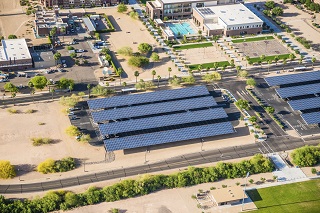From Guest Blogger Amanda Bead: Improving Energy Efficiency Makes Good Business Sense
As climate change looms larger in the public conscience and energy efficient practices become more accessible, it makes sense for businesses to invest in more sustainable energy alternatives. The rate at which natural resources are being consumed is not sustainable, so altering buildings and business practices to include renewable energy generation is the logical next step. Shifting to more energy efficient practices may also have unexpected advantages that can affect a business in both the short term and the long term.
Renovations May Net Energy Tax Credits
Capital invested in improving energy efficiency may be claimed as a deduction in income taxes, decreasing the total tax burden for the year. Investments in equipment and renovations that improve efficiency in lighting, heating and cooling, building envelop, and practices that may be relevant to specific businesses can all net various tax credits.
To ensure that a business receives the maximum allowable deduction, it may be best to work with cost segregation experts. Cost segregation experts may know about energy tax incentives that are not obvious and may be able to provide advice regarding further energy efficiency advancement that could net further savings.
Improved Efficiency Will Defray Utility Costs
Acquiring energy efficient appliances and improving the energy efficiency of a building allows the same degree of comfort to be achieved while using less energy. This may seem obvious, but is a benefit that is often overlooked. When a building is capable of generating energy without outside intervention and appliances can be run using less energy, utility costs are reduced. For large buildings or businesses with multiple locations, this could mean substantial savings.
Environmental Ethics May Impress Customers
Customers are becoming increasingly concerned with the environmental stance of businesses. A failure to alter practices may negatively impact revenues as customers feel they are “supporting” practices that do harm to the environment. While simply failing to switch to solar energy or change out light bulbs is not likely to turn customers away, integrating environmental objectives into the foundation of the business may work to win the hearts and minds of customers, fostering greater loyalty.
Renewable Energy Generation May Improve Energy Security
Relying completely on the local energy grid may affect business when power outages occur. Business downtime can mean lost revenues. Renewable energy sources have the potential to act as a supplemental power source in cases when the local energy grid is unreliable due to storms or other events. This may help to preserve business uptime, increasing the perception of business reliability to customers and preventing losses. This can be a substantial advantage in areas where power outages are common.
To find out more about how energy efficiency can benefit a business, contact local cost segregation professionals or green energy experts in the local area.


Don’t forget water – efficient water use delivers important environmental improvements whilst often also saving energy.
Every drop of water we use requires energy to treat, deliver, and dispose of, not to mention the very considerable amount of energy used to heat water.
Taking measures to reduce water use, to treat and reuse water, and where appropriate, to store rain water from the roof means less water is abstracted from the environment – especially important in water stressed regions.
In Europe, some companies are beginning to think in terms of the water footprint of their products, and seeking to reduce water related impacts.
I would suggest that environmentally sustainable water use should always be considered as part of an overall resource efficiency package.